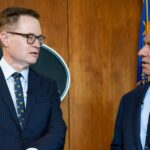In a significant move that has stirred political circles and prompted debates on security protocols, President Donald Trump has elected to revoke the U.S. Secret Service protection extended to former Vice President Kamala Harris. This decision marks a deviation from recent precedents where former vice presidents have continued to receive government-provided security beyond the standard post-administration period due to ongoing threat assessments.
Traditionally, under legislation enacted by Congress in 2008, former vice presidents, along with their spouses and minor children under the age of 16, are entitled to Secret Service protection for six months following their departure from office. However, this period has often been extended in light of enhanced threat environments that characterize our modern political landscape. Such extensions underscore the precarious nature of public life for high-profile political figures in an increasingly divisive era.
According to the law, the Secretary of Homeland Security has the discretion to direct the Secret Service to prolong this protection if assessments or prevailing conditions demonstrate a clear need. In the case of Kamala Harris, this precedent was initially honored. Former President Joe Biden, recognizing potential threats, signed an executive order at the outset of January, extending Harris’s Secret Service detail to 18 months post-administration.
However, in a turn of events on Thursday, President Trump issued a directive that counters his predecessor’s executive order. Through an executive memorandum to Homeland Security Secretary Kristi Noem, Trump ordered the cessation of Harris’s Secret Service detail, effective from September 1. Following Trump’s directive, the Department of Homeland Security duly notified the Secret Service, which confirmed that it would comply with the new order.
Prior to this resolution, the Secret Service conducted a comprehensive threat assessment on Harris and found no explicit threats that would necessitate an extension of her security detail beyond the customary six months. This lack of alarming threats played a part in the decision to rescind the extended protection.
Expressing gratitude regardless of the cessation, Kirsten Allen, a senior adviser to Harris, released a statement highlighting the professionalism and dedication of the Secret Service. Allen stressed that while the security measure was appreciated, the team respected and would comply with the administration’s decision.
This move by President Trump is not isolated in its nature but rather part of a broader pattern observed since his return to the White House for a second term. Trump’s administration has previously removed Secret Service protection from several individuals, including John Bolton, his former national security advisor, and Hunter Biden and Ashley Biden, the adult children of Joe Biden.
While former presidents and their spouses are entitled to lifetime Secret Service protection, their children are only covered up to the age of 16, unless an extension is approved. Toward the end of his term, Joe Biden had signed an executive order extending the protection of his adult children, which several sources reported in March as being under review by the current administration.
These decisions reflect a broader discussion about the allocation of Secret Service resources and the assessment of risk to former national leaders and their families. In an era where political tensions run high and security threats are an ever-present concern, the judgment to expand or curtail security coverage remains a critical point of contention and national interest.
Moreover, the implications of such decisions are wide-ranging, affecting not only the individuals directly involved but also setting precedents for future administrations. The balance between necessary security and resource allocation continues to challenge administrations, inviting varied opinions from across the political spectrum on the necessary scope and scale of protection afforded to those who have served at the highest levels of government.
As these developments unfold, they continue to garner significant attention and debate among security experts, lawmakers, and the public alike. The intersection of policy, security, and politics ensures that such decisions remain focal points for discussion, reflecting deeper questions about national security priorities and the personal safety of public figures in a complex global environment.









